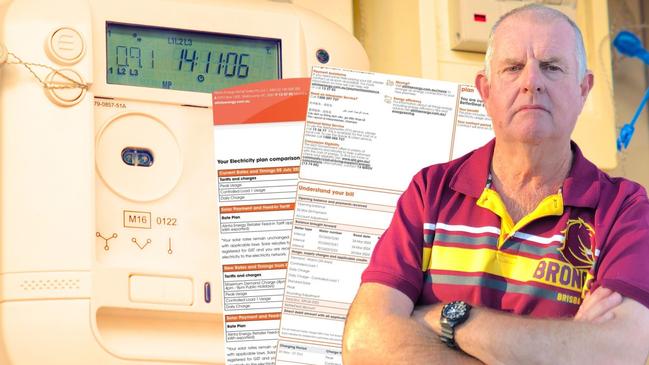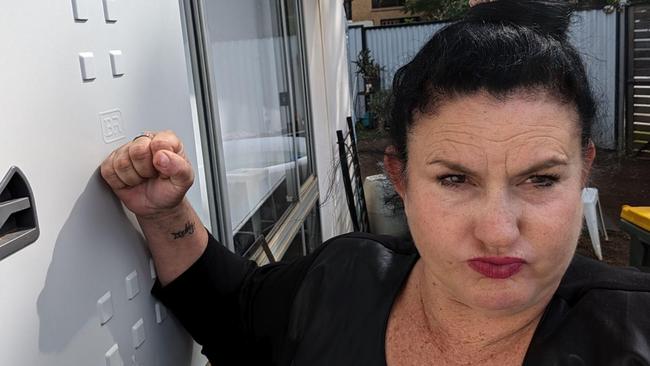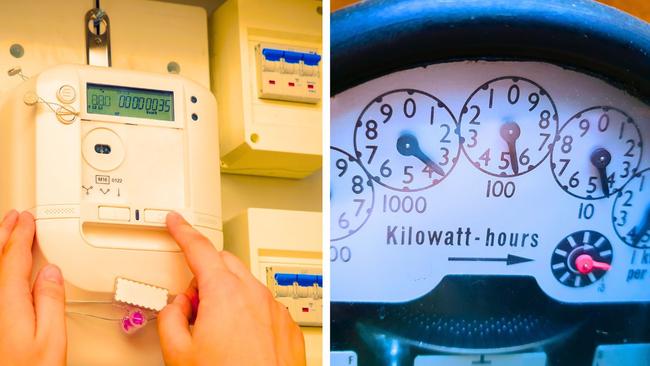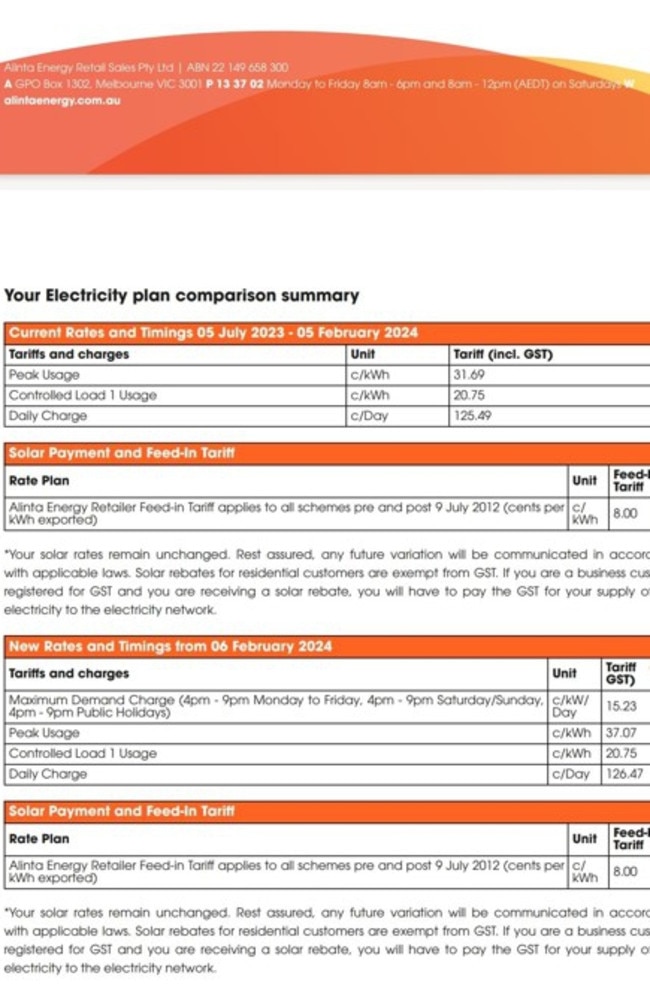Smart meter switch leaves hundreds of families in dark
Pensioners have started cooking their dinner in the middle of the day to avoid hefty peak electricity prices, after changing their meters, with one bayside family forced to shell out $5500. TAKE OUR SURVEY

Logan
Don't miss out on the headlines from Logan. Followed categories will be added to My News.
Pensioners have been warned to check the fine print if offered a free smart electricity meter, after dozens of bayside families have complained about being ripped off after transiting to the new meters.
The families are claiming they are being slugged an extra 15c per kilowatt hour on a new smart meter tariff.
The warnings come as one of the largest class actions in Queensland’s history continues in the Federal Court, over electricity costs paid in Queensland from 2015 to 2021.
Two Queensland electricity generation companies, Stanwell and CS Energy, are defending claims that electricity costs were inflated between 2015 and 2021 because of alleged wrongful conduct.
The court case does not involve the claims by Redland Bay postman Jeff Wraight who said he was “entrapped” into taking up a new smart meter this year, which he said came with hidden costs which added at least an extra $75 a quarter to his bill.
Despite begging the energy ombudsman and energy provider Alinta to return his former “dumb” meter, the family is now stuck with paying the higher peak charges.
“I used to enjoy coming home from work and having dinner in the airconditioning and then watching TV,” Mr Wraight said.
“But now that’s all changed and we have to cook the evening meal during the day because we can’t afford to have all the electric appliances on during the peak when we are hit with the extra 15c charges on top of what we were paying.
“My neighbours are not on the smart meter and don’t have to pay this additional cost – so it is very unfair.
“I feel the energy provider lied to us and never told us about the hidden costs of using power during peak periods or the reduction in the number of tariffs we could choose from.
“If I was told at the start that I would be hit with an extra 15c per kilowatt hour at the busiest time of day, I would never have signed up for a smart meter.”

Mr Wraight, wife Di, their three grown children and a mother-in-law, have been forced to cook dinner hours before the peak electricity period kicks in at 4pm to evade being slugged the added 15 cents per kilowatt hour under a new energy tariff, designed for the digital meters.
Now, the prospect of sitting down to a family meal, once a cherished evening event, has become a strategic family manoeuvre to save on soaring electricity bills.
Mr Wraight said he eagerly agreed to a free smart meter installation after receiving a letter from energy provider Alinta claiming it would “future-proof” his home.
But what he was not told was the new meters would not allow customers to use a single-rate tariff, across an entire day, like the non-digital “dumb” meters.
On the new meter, the family is billed under a “Time-of-use” tariff, which charges higher rates during dinner peak periods from 4pm to 9pm.
Instead of being charged just a former flat rate of 37.07 cents per kilowatt hour for the period from 4pm to 9pm, the Wraight family is now being charged an extra 15.23 cents per kilowatt hour during the peak time.
Mr Wraight is not the only bayside resident complaining about the new tariff structure and fees under the smart meters.
Thornlands man Mark Cubby had a smart meter installed and expected to save money but his electricity bill increased greatly.

Victoria Point mum Kylie Houghton said her electricity bill increased by $800 a quarter since she had the smart meter installed.
But what incensed her the most was that she had to pay $3200 to get the new meter installed after Origin Energy told her there was a defect with the old meter and it was too old to fix.
“To add insult to injury we also copped an $800 increase in our electricity bill which went up from the usual $1200 a quarter to a massive $2000 when we got the first bill and that was with a $137 state government rebate,” Ms Houghton said.
Ms Houghton joined an online group of people who are in the same situation was formed.
All in the group claim they were told the smart meter would save them money, when in fact, the new meter comes with new added costs for electricity use between 4pm and 9pm every day.

In southeast Queensland there are at least 25 retailers actively competing including AGL, Alinta Energy, Amber Electric, Ampol Energy, CovaU, Diamond Energy, Dodo, Energy Locals, EnergyAustralia, ENGIE – formerly Simply Energy, Future X Power, Globird Energy, Kogan Energy, Locality Planning Energy, Momentum Energy, Nectr, Origin Energy, OVO Energy, Pacific Blue Retail, Powershop, ReAmped Energy, Red Energy, Sonnen, Sumo and Tango Energy.
Across the southeast, 43.16 per cent of customers have digital meters while statewide, the figure is 44.47 per cent.
Although there are massive peak-hour rate differences for smart and dumb meters, the “off-peak” rates are very similar, with dumb meter rates higher by up to 4c/kWh.
An electricity industry expert, also from Redland, with wholesale energy trading experience at Stanwell and Shell Energy, who cannot be named, said those who took up the smart meters were being penalised.

“To put it in simple terms, it is like a petrol station selling fuel at different rates per litre depending on what type of car the motorist drives up in – it is completely unfair and penalising those who thought they were doing the right thing,” he said.
“If you have a smart meter, you have very limited offerings for a single-rate energy plan from retailers.
“Most retailer offerings are Time of Use (TOU) plans which impose a much higher rate during peak usage, which is determined by when the majority of people use energy.
“If you don’t have a smart meter and instead have kept your old-style rotating disk meter, you have numerous offerings for single-rate plans.
“Single rate plans are of lower risk to customers compared with TOU plans, and in most cases, result in much higher energy costs.
“In addition, where a retailer does offer a single rate plan to a smart meter customer, that plan is of a higher energy and ongoing daily rate than the plan offered to non-smart meter customers.”

Last year, PowerPlay founder from Redland Phoenix Shaw-Collery said a model of cheap energy in evening peaks punished those who used less-than-the-average amount of electricity during night peak times.
The company devised a “customer loyalty” package for those who wanted to use power during the day but keep bills low.
Under the designed package, customers received an electricity smart meter, which monitors electricity use in the home and indicated the cheapest time of day to use an appliance.

The Australian Energy Market Commission has requested all households have a smart meter by the end of 2030, which will mean some customers will be paying the higher charges for at least six years.
AEMC chair Anna Collyer said smart meters offered customers diversity.
“Consumers can make informed choices which, in turn, open the way to greater retail options that suit their family or business usage patterns,” she said.
“The electricity market needs a critical mass of smart meters across households and businesses before we can introduce other significant advances necessary to reach net zero.”
In April, another overseeing body, the Australian Energy Regulator said it had concerns about the way the time-of-use tariff system was being implemented and said it would be watching energy retailers to ensure they meet their customer obligations.

A spokesman for the Queensland Energy Department said retailers must notify customers of any changes in tariffs before sending out the next bill with customers able to switch providers if unhappy with the new pricing structure.
“The government encourages all customers in SEQ to shop around regularly to find the electricity retailer with the product and pricing structure that best suits their needs,” the department said.
“In regional Queensland, electricity tariffs are regulated by the Queensland Competition Authority.
“Customers with smart meters continue to have access to all regulated tariffs, including flat rate, time-of-use or demand tariffs and Ergon Energy Retail will not change a customer’s tariff choice without the informed consent of the customer.”
Originally published as Smart meter switch leaves hundreds of families in dark




